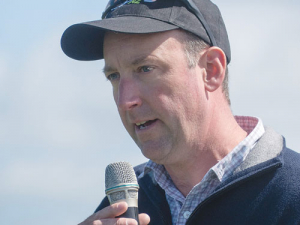DairyNZ opens applications for associate director role
DairyNZ is giving New Zealand farmers a unique opportunity to gain hands-on governance and leadership experience within the dairy sector.
 DairyNZ biosecurity manager Chris Morley believes imported semen is the most likely source of the M.bovis incursion.
DairyNZ biosecurity manager Chris Morley believes imported semen is the most likely source of the M.bovis incursion.
DairyNZ biosecurity, readiness and response manager Chris Morley would bet on imported semen as the most likely source of the Mycoplasma bovis incursion.
Speaking at the recent Lincoln University Dairy Farm spring focus day, Morley said the source of infection remains the “million dollar question”.
He said M bovis typically moves in live animals, semen and embryos, or “theoretically” on something like unwashed milking equipment being smuggled in.
Morley, who sits on the governance board for the Mycoplasma bovis response team, says it was unlikely to have come in from live cows because nothing had come in for three years, and gene sequencing now being done discounted that route.
That left semen and embryos.
“If you look at it, just on likelihood, we’re bringing in quite a lot of semen from overseas compared with embryos, so my bet would be semen,” Morley explained.
“What’s interesting is that internationally semen has never been shown to spread disease to a farm, but we know if you test semen you will find M.bovis bits periodically. If you test enough semen you’ll find it eventually. Whether that’s enough to cause disease has always been argued.”
LUDF veterinarian Chris Norton pointed out a “hole in the fence”, in that it is possible to buy semen from around the world without declaring it as having been taken from a bull found free of Mycoplasma.
However, Morley says trying to force suppliers to test every bull becomes a trade issue because they do not think it is a valid concern. He says MPI had “been there a number of times”.
“I wouldn’t be rushing to say MPI’s dropped the ball on this,” Morley added.
Semen can only be imported from countries free of foot and mouth and with a high health status, chiefly from North America and Europe.
“They do not have to test every single bull. All it says on the certificate – there’s a whole bunch of clauses on there about diseases – is ‘there’s no known evidence of Mycoplasma bovis in the bull’.”
Morley admits that “no known evidence” is actually quite a weak statement from a disease point of view.
“The reason it’s not been changed or tightened up is because when you try to negotiate with other countries, all of those breeding companies say there’s no scientific evidence to show it’s ever spread in semen. There’s a cost to doing this, no-one else is asking for it, so we’re not doing it.”
Morley says that because every other country has got M.bovis, they cannot tell if it is being spread through semen, or animals touching noses over the fence. That put New Zealand in the unique situation to be able to test the hypothesis that it could spread through semen. However, he does not think it will ever be possible to say it came from any particular straw.
The World Wide Sires National All Day Breeds Best Youth Camp Best All Rounder plaudit has become family affair, with 2026 Paramount Cup winner Holly Williams following in her sister Zara's footsteps.
DairyNZ is giving New Zealand farmers a unique opportunity to gain hands-on governance and leadership experience within the dairy sector.
Herd improvement company LIC has posted a 5.2% lift in half-year revenue, thanks to increasing demand for genetics.
According to the latest Fresh Produce Trend Report from United Fresh, 2026 will be a year where fruit and vegetables are shaped by cost pressures, rapid digital adoption, and a renewed focus on wellbeing at home.
The Roar is a highlight of the game hunting calendar in New Zealand, with thousands of hunters set to head for the hills to hunt male stags during March and April.
OPINION: The past few weeks have been tough on farms across the North Island: floods and storms have caused damage and disruption to families and businesses.

OPINION: Meanwhile, red blooded Northland politician Matua Shane Jones has provided one of the most telling quotes of the year…
OPINION: This old mutt has been around for a few years now and it seems these ‘once in 100-year’ weather…